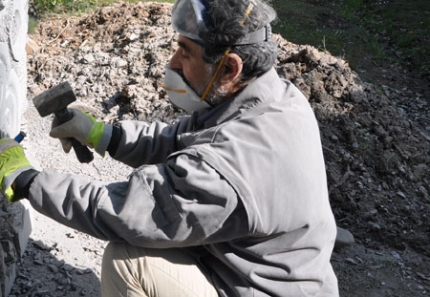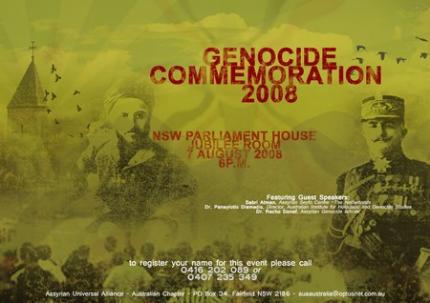By Sabro Bengaro —The Assyrians have a historical presence in Greece. For the past two decades, Aigaleo—a suburb of Athens—has served as the first destination for many Assyrians emigrating from their ancestral homeland in Mesopotamia to America, Australia, and various parts of Europe
Some stayed in Aigaleo for only a few months, while others remained for years before moving on to their intended destinations. A few, saying, “We prefer Aigaleo over the rest of America,” chose to stay.
I have traveled to Greece many times, though not for leisure. Each time I arrive in Athens, my friend Kyriakos Batsaras greets me at the airport, holding a cardboard sign that reads: “Assyrian Sabri!” On one occasion, the sign was even taped to his car.
Years had passed since my last visit to Athens, and Kyriakos informed me beforehand that he’d be wearing a cap with the Assyrian flag on it. But even without the cap, I could recognize him from 500 meters away. When we finally met, we both felt an unexpected sense of youthful energy.
Kyriakos’s commitment to the struggle is unwavering. I’ve always seen him as someone deeply aware of the national cause and the hardships faced by our people—a consciousness shaped by his father, who understood the pain of displacement and the long process of integration. Despite these challenges, Kyriakos remains determined to fulfill his personal responsibilities in this brief life.
During our time together, I asked him a few questions—and I would like to share Kyriakos Batsaras responses with you.
Could you please briefly introduce yourself?
My name is Kyriakos Batsaras and I am the chairman of the Assyrian Union of Greece.
You are one of the most active figures in the Assyrian cause in Greece. Who or what inspired you to become involved in this work, and how did that influence you?
There are many factors that inspired me, mainly the patriotic duty. I believe that every Assyrian, since the day he/she is born, has a patriotic duty to work for the Assyrian nation. This is the reason why I work tirelessly in order to fulfill my duty.
Can you tell us about your family’s origins?
My parents (father and mother too) were Assyrians who were born in Greece, originating from Tal. We are Talnaai.
What do you know about the history of Assyrians in Greece? How did they arrive here from their homeland?
For this question, I will give a long answer:
The ancient Assyrian state was in present-day Iraq, with Nineveh as its capital city. In the beginning of the 20th century, about 4-5 million Assyrians were residing there. Those who survived the 1915 Genocide by the Neo Turks of Mustafa Kemal marched following an itinerary of blood, Iran being their first stop. Several thousand remained there and the others continued to Tsarist Russia. In 1922 they departed from the Soviet Union harbor Novorossiysk, hoping that another country will welcome them, even temporarily. After crossing the Bosporus Strait, they reached Greece following an exhausting journey: Makronissos, Aghios Georgios, Poros, Aegina, Keratsini, Kalamata, Athens, Larissis Station, Kalogreza, Moshato, Egaleo. Another large part of the Assyrian people moved south and, from a Syrian port, travelled by boat to Cyprus. Some of them settled there, while the rest continued their journey to Lavrio, where they worked at the mines. After the closure of the mines, they left Lavrio in search of occupation. In the beginning of the 1930s, a few Assyrian families from Serbia arrived and remained permanently in Greece. In 1970 we welcomed Assyrian refugees from Lebanon due to the civil war as well as Assyrians from Turkey and, in the 1980s, Assyrians from Iran due to the Iran-Iraq war. Between 1990 and 1996, Assyrians from the ex-Soviet Union arrived in the north of Greece, and from the late 1990s until 2010, Assyrian refugees from Iraq found refuge in our country. Lastly, since 2011 Greece has welcomed Assyrian refugees from Syria due to the civil war. Realizing that their repatriation was almost impossible, Assyrians integrated within the Greek society, actively contributing to the Greek economy. Today’s Greek-Assyrians are located all over Greece. We can safely say that in Greece, one may find people from the Assyrian nation originating from all the countries and areas that have Assyrian populations.
What is the current state of Assyrian genocide studies in Greece?
The conference that took place in Athens on June 13-14, 2025, is the result of the work that we have been doing for many years. Work that we have carried out together with two valuable colleagues, Magda Zervou and Yiannis Kiosaba, both of whom you have already met. Without these two colleagues, we would not have been able to achieve many results, such as the building that houses our union, the genocide monuments, conferences and congresses, and so many more. I sincerely thank them. And bear in mind that if it weren’t for the above two people and myself, the Assyrian Union of Greece would not exist now. We gave our souls and personalities to this cause so that the coming generations of Assyrians will have something to feel part of.
How would you describe your collaboration with Greek institutions involved in genocide research or commemoration?
Apropos of the recognition of the Assyrian Genocide by the Greek Parliament, I would say that our collaboration with the Greek State is quite satisfactory. The goal of recognition remains, as do our efforts.
The International Assyrian Genocide Conference took place in Athens on June 13–14. What are your thoughts on how the conference went?
The biggest success of the conference is that it took place under the auspices of the Greek state.
This is something that has never happened before in any world country for the Assyrian people and this is what makes the Assyrians in Greece differ from the Assyrians of the world. We are only a few people but we are much stronger than the many. I believe that this conference was the best of all the previous ones. The conference proceedings will be published in English and this book will be promoted throughout the world.
Do you believe the Greek Parliament will recognize the Assyrian Genocide in the near future?
As previously said, our goal is to achieve the recognition the soonest possible.
Is there anything else you would like to share or add?
There are many things I would like to say. Firstly, we are currently preparing a visit to the
Acropolis Museum and especially to the exhibition of Assyrian monuments there. Secondly, we are organizing the projection of a documentary concerning the Assyrian Genocide that will take place during autumn. We are also preparing common events and actions with the Pontiac Greeks and the Armenians. And many more…
I understand that, through the above questions, you wish to know more about us. You should come to spend some time here in Greece and visit the places where Assyrians lived 103 years ago and where they live today. I will be glad to host you with patriotic greetings.
Thank you.



